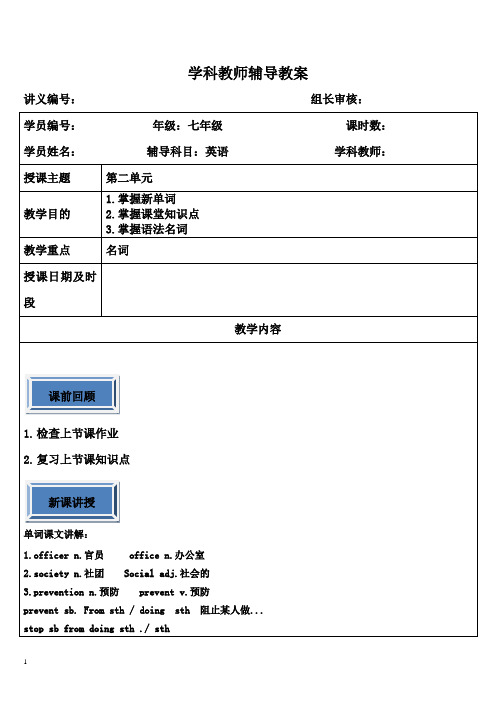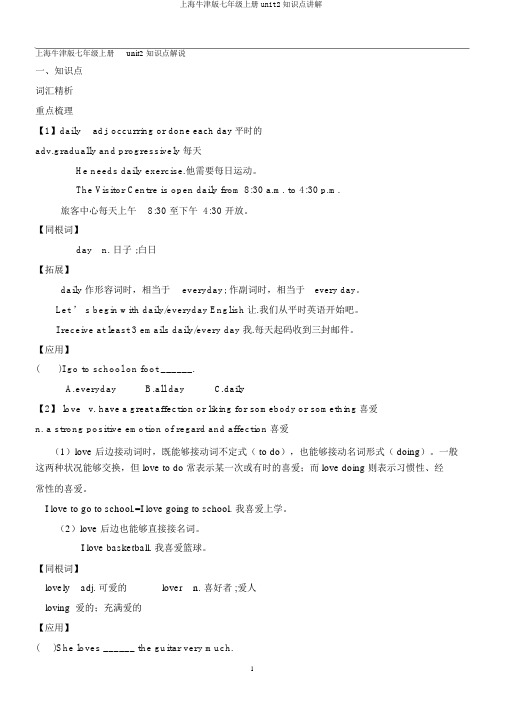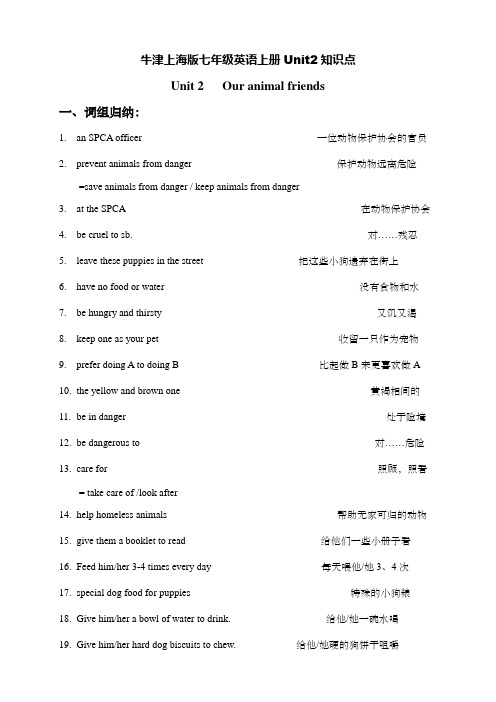新牛津上海版英语七年级上册《unit 2 at the airport》教学设计(精品).doc
牛津上海版七年级上册U2教案

5、名词所有格 名词所有格(possessive case)表示人或物的所属关系。主要有三种形式:’s 形式, of +名词形式 和双重所有格形
名词
专有名词(Tom,Shanghai,USA, UN)
举例
普通名词
可数名词
个体名词
person,desk,
集体名词
audience,crew
不可数名词
物质名词
stone,iron
抽象名词
glory,quality
2、名词复数的规则变化
3
名词单数的特征
复数构成方法
举例
规则名词
在名词单数后直接加-s
式 1) ’s 形式 所有格
即:表示有生命的东西的名词的所有格
表示有生命的东西的名词(人或动物)的末尾,加上's,即构成所有格,可放在另一名词之前,作定语用。如:
John's friend 约翰的朋友
Xiao Wang's notebook 小王的笔记本
children's books 儿童读物
my father's room 我父亲的房间
knife---knives life---lives
leaf---leaves
wolf---wolves thief---thieves;
有些,直接加-s
belief---beliefs
roof---roofs safe---safe s gulf---gulfs;
上海牛津版七年级上册unit2知识点讲解

上海牛津版七年级上册unit2 知识点解说一、知识点词汇精析重点梳理【1】daily adj. occurring or done each day平时的adv.gradually and progressively每天He needs daily exercise.他需要每日运动。
The Visitor Centre is open daily from 8:30 a.m. to 4:30 p.m.旅客中心每天上午8:30 至下午 4:30 开放。
【同根词】day n. 日子 ;白日【拓展】daily 作形容词时,相当于everyday; 作副词时,相当于every day。
Let ’ s begin with daily/everyday English让.我们从平时英语开始吧。
I receive at least 3 emails daily/every day我.每天起码收到三封邮件。
【应用】()I go to school on foot ______.A.everydayB.all dayC.daily【2】 love v. have a great affection or liking for somebody or something喜爱n. a strong positive emotion of regard and affection喜爱(1)love 后边接动词时,既能够接动词不定式( to do),也能够接动名词形式( doing)。
一般这两种状况能够交换,但 love to do 常表示某一次或有时的喜爱;而 love doing 则表示习惯性、经常性的喜爱。
I love to go to school.=I love going to school. 我喜爱上学。
(2)love 后边也能够直接接名词。
I love basketball. 我喜爱篮球。
【同根词】lovely adj. 可爱的lover n. 喜好者 ;爱人loving 爱的;充满爱的【应用】()She loves ______ the guitar very much.A.playB.playingC.plays【3】 seldom adv. not often 极少;不常I seldom go to the cinema.我极少去看影。
2018牛津上海版(一起)六下Unit2《Attheairport》教案

2018牛津上海版(一起)六下Unit2《Attheairport》教案Unit 2At the airport一、单元分析〔 Unit Analysis〕〔一〕单元地位〔 Unit Position 〕1本课中出现了现在完成时,如:have lived, have never been to, have done等,教师有必要在课堂教学中帮助学生回忆一下6A Have you ever eaten hot dogs?) , (What have you done today?), 等现在完成时出现的单元及与之搭配的时间状语,这是本单元的学习重点,因此对此时态的运用必须加以反复的操练。
2在本课中还出现了一些表示时间的时间状语,如:for six years/two weeks/until the end of the month 等。
建议教师以旧带新,复习never/already/just/ever等,并让学生能熟练并准确地使用这些副词及时间状语。
3在课文中还出现了较多的一般将来时be going to, will,以及与之连用的how long特殊疑问句式。
4在本课中,出现了 a lot of, plenty of, a few, a little, much, several, a small amount of 以及 not too many和 not too much等模糊数量的词及词组,建议帮助学生一起复习一下 6A /Module 3/ Unit 2中出现的大量表示数量的词,如:a lot of, plenty of, some,a little, too much, too little, not enough等,并鼓励学生根据表达需要进行合理搭配,综合运用。
5在本课中,出现了用许多机场内的标志,如: Trolleys, Toilets, Escalators, Come in here, go out here 等,教师可提供更多机场内不同的图片,供学生进行认知并进行操练,让学生能学会识别并熟练掌握。
牛津上海版七年级英语上册Unit2知识点2

牛津上海版七年级英语上册Unit2知识点Unit 2 Our animal friends一、词组归纳:1. an SPCA officer 一位动物保护协会的官员2. prevent animals from danger 保护动物远离危险=save animals from danger / keep animals from danger3. at the SPCA 在动物保护协会4. be cruel to sb. 对……残忍5. leave these puppies in the street 把这些小狗遗弃在街上6. have no food or water 没有食物和水7. be hungry and thirsty 又饥又渴8. keep one as your pet 收留一只作为宠物9. prefer doing A to doing B 比起做B来更喜欢做A10. the yellow and brown one 黄褐相间的11. be in danger 处于险境12. be dangerous to 对……危险13. care for 照顾,照看= take care of /look after14. help homeless animals 帮助无家可归的动物15. give them a booklet to read 给他们一些小册子看16. Feed him/her 3-4 times every day 每天喂他/她3、4次17. special dog food for puppies 特殊的小狗粮18. Give him/her a bowl of water to drink. 给他/她一碗水喝19. Give him/her hard dog biscuits to chew. 给他/她硬的狗饼干咀嚼20. Give him/her a basket to sleep in. 给他/她篮子睡21. Give him/her a blanket to keep him/her warm. 给他/她毯子保暖22. Hold him/her carefully with both hands. 用双手小心的抱他/她23. Take him/her to a park for a walk every day. 每天带他/她去公园散步24. don’t need to do sth.不必做某事= needn’t do sth. / don’t have to do sth.25. a kitten / a young cat 小猫26. be kind/friendly to sb 对……和蔼可亲be unkind to sb. 对……不友善27. help sb. do sth. 帮助某人做某事= help sb. with sth.28. clinics for sick animals 收治生病动物的诊所29. the vets in the clinics 诊所的兽医30. play with kittens 和小猫玩31. junior members of the SPCA 动物保护协会的初级会员32. help sb. by doing sth. 通过做某事来帮助某人33. collect old blankets 收集旧毯子34. raise money for … 为……筹钱35. be useful to …对……有用36. live in a cave 住在洞穴里37. hunt for food 猎食38. life guards 救生员39. guard the houses 守卫房屋40. a blind man 一位盲人41. in different ways 用不同的方法42. on the farm 在农场43. cross the road safely 安全地过马路44. find missing people 找到失踪的人45. catch a thief 抓小偷catch thieves 抓捕小偷46. make a display 制作展板47. the SPCA 动物保护协会= the Society for the Prevention of Cruelty to Animals48. keep warm 保暖49. play with a puppy 和小狗玩50. need to do sth. 需要去做某事否定句don’t need to do51. promise to do sth 承诺做某事promise not to do sth 许诺不做某事52.take good care of 好好照顾= look after well53.the police 警方54. Do you know what the SPCA is? 你知道什么是SPCA么?55. keep one puppy as your pet 养一只小狗作为宠物56. like best = favourite 最喜欢57. prefer the black one 更喜欢黑色的一只58. a basket to sleep in 一个睡觉的篮子59. hold … carefully with both hands 用双手小心地抱着60. buy sth for sb 为某人买某物61. sometimes 有时候62. save animals from danger 拯救动物免受危险63. must do sth. 必须做某事64. sick animals 生病的动物65. keep people safe from danger 保护人们安全免受危险66. hunt animals for food 猎杀动物获取食物67. should do 应该做某事68. on their farms 在他们的农场里69. bring sth to sb 把某物带给某人70. look after sb well = take good care of sb 很好的照料某人71. in many different ways 在许多不同的方面二、新单词/词组讲解:1.mean 意为“表示…的意思”(过去式meant)【例句】What do you mean?What do you mean by…?【拓展】What’s the meaning of …?What’s the meaning of this word?2.arrive at 意为“到达”(1)arrive at 后面接小地方(如车站、影院等)(2)arrive in 后面接大地方(如国家、城市、地区等)(3)若是地点副词,则不需要介词【例句】We arrived at the airport at four o’clock.【拓展】Reach 是及物动词,后面无需介词Get 是不及物动词,后接to3.welcome 意为“受欢迎的”【拓展】welcome的特殊用法:◆“欢迎某人做某事”可以说“sb. be welcome to do sth.”【例句】Foreign friends are welcome to visit China.◆“欢迎某人来某处” 可以说“Sb. be welcome to some place.”【例句】You’re welcome to Beijing.4.allow 意为“允许”,后面可以接名词、代词,或接宾语从句“允许某人做某事” :allow sb. to do sth.【例句】Our teacher allows us to go out for a walk.5.by oneself表示“单独;独自”,相当于alone【例句】The old man lives all by himself in that big house.【常用短语】talk to oneself teach oneself enjoy oneself Dress oneself help oneself to6.apologize 意为“道歉”apologize to sb. 向某人道歉apologize for sth/ doing sth 为某事/做某事道歉【例句】He apologized to her for coming late.7.lead (sb.) to. “带着(某人)到…”【例句】The waiter lead him to his seat.【拓展】lead to 还可以表示“ 通向…”【例句】The road leads to the sea.8.fall asleep 意为“入睡”,侧重“自然而然地入睡”或“无意识地睡着”【注意】go to sleep入睡go to bed上床睡觉be asleep强调睡觉的状态9.start/begin to do【例句】Everything begins to grow in spring.10.wake up “醒来”;作及物动词表示“唤醒”【例句】I woke up at five this morning. 今天早上5点钟我就醒了。
《At the airport 》 教学设计

《At the airport 》教学设计一、教学目标1、知识目标学生能够掌握与机场相关的常见词汇和短语,如“checkin counter”(值机柜台)、“boarding pass”(登机牌)、“luggage claim”(行李领取处)、“departure lounge”(候机室)等。
2、技能目标(1)能够听懂在机场的常见对话,如办理登机手续、行李托运、询问航班信息等。
(2)能够运用所学词汇和句型进行简单的机场场景交流,如询问登机口、寻找行李等。
3、情感目标(1)培养学生在实际场景中运用英语的自信心。
(2)增强学生对不同文化场景的了解和包容。
二、教学重难点1、教学重点(1)掌握机场相关的重点词汇和句型。
(2)能够熟练运用所学进行机场场景的听说交流。
2、教学难点(1)理解并正确运用与航班、行李等相关的复杂表述。
(2)在实际场景中灵活应对不同的交流情况。
三、教学方法1、情景教学法通过创设机场的情景,让学生身临其境地感受和学习。
2、任务驱动法布置相关的任务,如模拟办理登机手续、寻找行李等,让学生在完成任务的过程中掌握知识和技能。
3、小组合作法组织学生进行小组合作,共同完成学习任务,培养学生的合作能力和交流能力。
四、教学过程1、导入(5 分钟)通过播放一段机场的视频或展示机场的图片,引出本节课的主题“At the airport”。
提问学生是否有在机场的经历,引导学生分享自己的感受和经历。
2、词汇学习(15 分钟)(1)展示与机场相关的图片,教授新单词和短语,如“checkin counter”、“boarding pass”、“luggage claim”、“departure lounge”等。
(2)通过单词游戏,如猜单词、单词接龙等,帮助学生巩固所学词汇。
3、句型学习(15 分钟)(1)呈现与机场场景相关的对话,引导学生理解和学习常用句型,如“Can I have a window seat, please?” 、“Where is the boarding gate?”等。
Unit 2 At the airport 第2课时 语法知识及拓展(备课堂)(牛津上海版)

Have I/you
Yes, you/I have.Yes, No, you/she/it he/she/it has.Yes,
he/she/it has not.
worked?Have
you/we/they have.
No, you/we/they have
3. is an indoor activity.A. Going on a picnic
B. Playing footballC. Playing
the piano D. Playing badminton( ) 4. A: do you watch TV? B: Twice a week.A. How long B. How soon C. How far D. How often( ) 5. Don't
肯定式
否定式
I/You have worked.He/She/It has I/You have not worked.He/She/It
worked.We/You/They have worked. has not worked.We/You/They have
not worked.
疑问式
简略答语
forget a trolley when you are in a supermarket.A. taking
B. take
C.
to take D. taken( ) 6. Mary often helps her mother some housework.A.
doing
B. do
C. did
D. have done
几个
副词 adv.
19.
以前
20.
沪教牛津版(2024)七年级英语上册+习题课件+Unit+5+Section2+Grammar+课件
A. Are; will borrow
B. Is; going to borrow
C. Will; borrows
D. Are; going to borrows
2.It will _____ very cold tomorrow.
A. be
B. is
C. going to be
D. are
3.I_____ shopping with my mum next weekend.
随堂练习:单项选择 1.Tom ________ at 10pm.
A. are going to arrive B. will be arrive C. is going to 2.Tina ________ for Shanghai in three days.
A.left B. is left C. is leaving D. leaves 3.—Hellen, where are you?
1.时间类标志词: tomorrow(明天)、the day after tomorrow(后天)、 next week(下周)、next year(明年)
具体时间段:in two weeks(两周后)、in five years(五年后) 未来某个时间段:in the future(在将来)、
some day(将来的某一天)
如:I’m leaving for Shanghai the day after tomorrow. 我后天去上海。
Helen, where are you going? 海伦,你去哪?
一般将来时
(2) 表示交通方式、行程安排的动词,如walk, fly, drive, ride, take (a taxi, a bus)等,现在进行时也表将来。 如:I’m driving to the library in the afternoon. 我下午要开车去图书馆 We are flying to London tomorrow. 我们明天要飞去伦敦。
上海牛津英语6bunit2attheairportexerciseone
Unit 2 At the airportExercise oneI.Fill in the blanks with the proper words. (选词填空)1.My parents are planning ___________ to Tokyo this summer. (going,to go)2.She will buy some silk ____________ as presents for her friends.(scarf/scarves)3.Have you got ______________ for everyone at the party (enoughapples/apples enough)4.They arrived ______________ the station before the train left.(at, in)5.Mrs. Wang has taught in this school ___________ ten years.(in/for)6.We have already __________ our suitcases. (pack, packed)II.用所给动词的现在完成时填空。
1.Mrs Wang and Grandma _______ _______ to Beijing before. (be)2._______ you _______ enough money to buy the computer (get)3.They _______ _______ in Los Angeles for 5 years. (live)4.Mrs. Li _______ _______ her suitcase yet. (not pack)5.They ______ _______ some presents for Aunt Wendy and Uncle Tom.(buy)6.How many cakes _______ your mum _______ for the party (make)7.He _______ _______ the watch for about 40 years. (have)8.My father _______ _______ in the factory for 25 years. (work)III.Choose the best answer. (选择最佳答案)( ) 1. Have you _______ a birthday present for your motherA. boughtB. buyingC. buyD. buys( ) 2. --- Have you returned the book to the library _______--- Yes, I have _______ returned it.A. yet; yetB. already; alreadyC. already; yetD. yet; already( ) 3. I’ve never been out of China _______. What about youA. alreadyB. overC. beforeD. just( ) 4. My son _______ up yet because he _______ to bed late last night.A. hasn’t got; has goneB. didn’t get; wentC. doesn’t get; wentD. hasn’t got; went( ) 5. There are many people in the room. We don’t have _______ to stand in.A. enough spaceB. enough spacesC. spaces enoughD. many space( ) 6. Tony and his friends plan _______ a barbecue at weekends. A. to have B. have C. has D. had( ) 7. We can get _______ information on the Internet.A. a lot ofB. a lotC. manyD. a fewIV.Rewrite the following sentences as required. (按要求改写下列各句)1.Peter has bought a new bicycle. (改为一般疑问句)_______ Peter _______ a new bicycle2.Wendy has put a hat in the suitcase. (改为否定句)Wendy _______ _______ a hat in the suitcase.3.Mr. Smith has played football for 40 minutes. (划线提问)_______ _______ has Mr. Smith played football4.She goes running for half an hour. (保持句意)It takes _______ half an hour _______ _______ running.5.I have written down some new words. (改为否定句)I _______ written down _______ new words.6. We have already visited the Disney Park in the USA. (改为一般疑问句)_______ you visited the Disney Park in the USA _______7.It takes about one and a half hours to travel to the airport. (划线提问)_______ _______ does it take to travel to the airport8.They are going to leave home at three o’clock. (划线提问)_______ _______ are they going to leave home。
教案At the airport (Oxford English 6B Module 1 Unit 2)
Have studentsdo more exercises on the present perfect tense.
Do more exercises on the present perfect tense
帮助学生巩固练习
Summary
1、several = some = a few
帮助学生巩固课文以及现成完成时的用法
Part III:Listen to the tape and answer the questions.
分段讲解课文内容以及语法点
Have students read the whole text and decide whether the statements are true or false.
beable to useprepositions to indicate a period of time
be able to usethe present perfect tense to relate past events
be able to use determiners to express quantities
学习新单词
Introduce the city of Los Angeles.
Look at the photos and learn something about L.A.
Brainstorm: what do you need to prepare before travelling?
Talk about the things they need.
Read the text and judge the sentences.
检验学生是否理解课文内容;关注细节
牛津沪教版英语七年级上Unit 2辅导讲义
七年级上U2Can 的用法:1,表示能力(如体力和脑力方面),意为“能;会”等。
例如:Can you speak English? 你会讲英语吗?Can you play the piano? 你会弹钢琴吗?2. 表示请求或允许,多用在口语中,意为“可以;能”等。
用于疑问句中用来提出要求,用于否定句表示不允许。
例如:Can I help you? 我能帮助你吗?You can’t play basketball. 你不能玩篮球。
3. 表示可能。
Errors Presentation1,An Englishman who ____not speak Italian was once traveling in Italy.A) must B) could C) may D) might2,He ____the 9:20 train because he didn't leave home till 9:25.A) can reach B) could catch C) may not catch D) couldn't have caught3.Mr Wang ______ be in Nanjing now, he went to Beijing only this morning.A. mustn’tB. may notC. can’tD. needn’t4. –Who is the man over there? Is it Mr Li?--No, it ______ be him. Mr Li is much taller.A. musn’tB. may notC. can’tD. needn’t5. A computer ______ think for itself, it must be told what to do.A. can’tB. couldn’tC. may notD. might notContent of courses重点单词:1.officer [ˈɒfɪsə(r)] n. 军官,警官; 高级职员; v. 指挥; 统率;变形过去分词: officered 复数: officersEg.He served during peace-time as an intelligence officer in the Navy.他在和平时期担任海军情报官员。
- 1、下载文档前请自行甄别文档内容的完整性,平台不提供额外的编辑、内容补充、找答案等附加服务。
- 2、"仅部分预览"的文档,不可在线预览部分如存在完整性等问题,可反馈申请退款(可完整预览的文档不适用该条件!)。
- 3、如文档侵犯您的权益,请联系客服反馈,我们会尽快为您处理(人工客服工作时间:9:00-18:30)。
Module 1 Garden City and its neighboursUnit 2: At the airport (I)Language focus:Using nouns / noun phrases to identify objects.Using prepositions to indicate a period of time.Using the present perfect tense to relate past events to the present.Using a djectives to express quantities.网]Using adverbs to express degree.[I. Warming-up:II. Pre-task preparation:1. Put the map of USA on the board. Ask students: Where is Los Angeles?2. Bring some photos or pictures of interesting places in Los Angeles to class. Circulate around the class to let students have a rough idea what Los Angeles looks like3. Introduce the new vocabulary items in Look and learn.4. Review quantifiers: Use real objects to review a lot of, many, plenty of, several, some, a small amount of, a fe w5. Remind students of the use of the present perfect tense in the passage. Go over the verbs in the present perfect tense with stu dents. Invite the more able students to speak out and spell, if possible, the corresponding verbs in their present tense form.6. Tell students that the use if the prepositional phrase: for (___)_days / weeks / months / years is used to indicate a period of time. Invite some students to answer questions, like this: How long have you studied in this school? How long have you learnt English? to elicit: I have studied in this school for ... / I have learnt English for ...7. Play the recording: Look and learn and Look and read. Students listen and follow in their books.8. Play the recording again. Students listen and repeat.9. Students read the text individually and write down the answers to the questions in Answer true / false. Check the answers with the whole class. Invite the more able students to review the false statements into true ones on the board.III. Consolidation:Grammar Practice Book 7A page 4.Unit 2: At the airport (II)Language focus:Using “going to” to describe events that will occur quite soon.Asking “Wh-” questions to find out time.Using prepositions to indicate time.Asking “How” questions to find out the length of a period of time.Using prepositions to indicate a period of time.I. Warming-up.II. Pre-task preparation:1. Introduce new vocabulary items: departure and arrival. Make sure students can differentiate between the two. Also make sure students can differentiate between a.m. and p.m.2. Look, read and think.3. Play the recording again. Students listen and repeat.4. Invite three students to come to the front and role-play the conversation. Aska more able student to act as Mr. Li in order to work out the time for leaving home. Encourage other students to supply any different answers.5. Ask students to read page 7 of the Student's Book again. They are required to write and draw the time. Students then help each other check answers in pairs.6. Have students work in pairs to read the dialogue in Ask and answer. Walk around and offer help and guidance to the less able students if necessary.III. While-task procedure:Draw the air tickets on the board and invite some volunteers to write the answers on the air tickets.IV. Post-task activity:Distribute a piece of drawing paper to each s tudent. Tell them to think about where they would like to spend a holiday and to draw their own air tickets with the relevant information. Collect the students' work and bind it into a booklet to be circulated in class.V. Consolidation: Grammar Practice Book 7A page 5.Unit 2: At the airport (III)Language focus:Using imperatives to give instructions and directions.Using nouns to identify objects.I. Warming-up:II. Pre-task preparatio1. Introduce new vocabulary items: trolleys and escalators. Put an enlarged photocopy of pictures of trolleys on the board. Point to the pictures and say: trolleys. Then put an enlarged photocopy of pic tures of escalators on the board. P oint to the pictures and say: escalators. Make sure students know the correct pronunciation of the vocabulary items.2. Review / Introduce: exit and entrance. Make sure students can differentiate between the two.3. Have students look at the eight signs and read the eight descriptions in Read and match carefully. Then ask them to match each sign with the suitable description. Finally, the whole class checks answers together. Ask students to point to the signs and read the descriptions aloud.III. While-task procedure:1. Draw the eight signs on the board and invite volunteers to come forward andwrite the descriptions under the signs.2. Tell students to imagine that they are at the airport. Ask them to think of three more signs that they can see at the airport. Tell them to draw the signs and write the IV. Post-task activity:Ask students to draw the signs that can be seen at restaurants, shopping centres, supermarkets, cinemas, swimming pools and on underground, buses, ferries, planes, etc.Unit 2: At the airport (IV)Language focus:[Using nouns / noun phrases to identify objects.Using the present perfect tense to relate past events to the present.Using adverbs to express time.I. Warming-up:II. Pre-task preparation:1. Review and introduce new vocabulary items in Look and learn. You may explain the meanings of these vocabulary items with real objects or pictures. Read the words aloud. Have students repeat after you2. Look and learn and Say and act.3. Play the recording again. Students listen and repeat.4. Students practise in groups the target language in Say and act by role-playing Mr. Li, Mrs Li and Grandma. Invite a few groups to come out and role-play the conversation in class.5. Have students work in pairs to talk about the checklist in Think and write. Have them complete the checklist by writing down what they have discussed with their partners.III. While-task procedure:1. Students discuss and agree on five items for a checklist before leaving forLos Angeles. Have them complete the checklist by writing down what they have discussed with their partners2. Still in pairs, students read the dialogues on page 9 of the Student's Book again. Students have to write some dialogues and role-play with their partners. They are required to use the target language learned in Say and act.3. Ask for volunteers to act out the conversations.IV. Post-task activity:Workbook pages 3 and 4.V. ConsolidationGrammar Practice Book 7A pages 6 and 8.。
